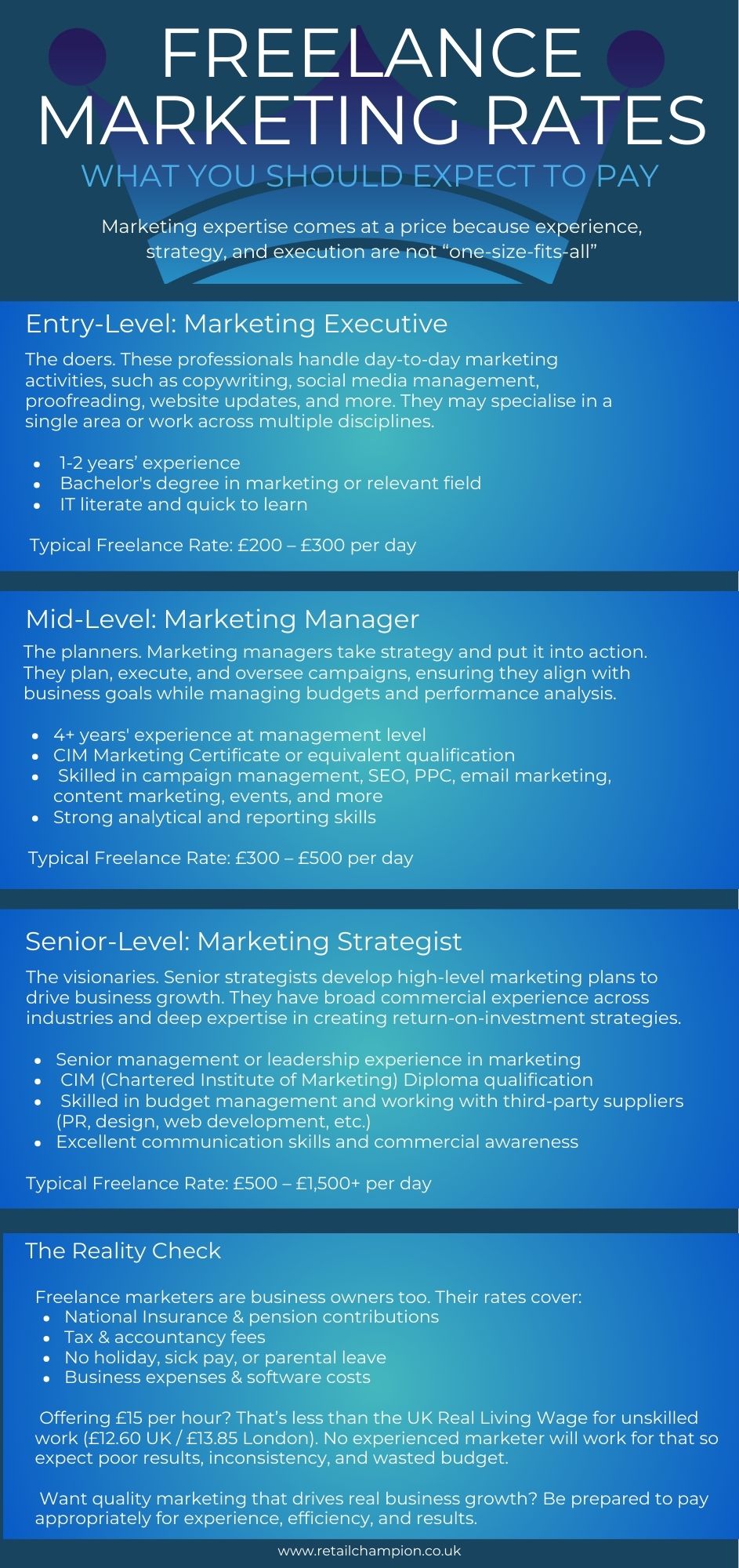Case Study: The Reality of Marketing Roles and Pay Disparities
A stark example of how marketing is undervalued is the number of contract roles advertised to cover an extensive range of marketing disciplines—content creation (words, images, and design), social media management, email marketing, and loyalty schemes—offered at around £15 per hour.
Not only is this not a skill set that the average person can claim to cover, but it would typically require two to three experts working collaboratively to execute effectively. Despite this, businesses expect to find a single contractor who can manage all these responsibilities at a rate far below industry standards.
Beyond the skill mismatch, no quality resource would accept a contract rate of £15 per hour. Contractors must cover their own National Insurance, pension contributions, and receive no holiday pay, sick pay, or parental leave. They are also responsible for their own tax returns or must pay an accountant to manage this for them.
The Real Living Wage for 2025 stands at £12.60 across the UK and £13.85 in London—minimum rates for unskilled work. When considering the additional costs that freelancers must cover—National Insurance, pension contributions, tax returns, and lack of benefits like holiday or sick pay—the reality is stark: the rates being offered for marketing roles are often at least three times lower than what a skilled professional would accept. No experienced, efficient, and talented freelancer will work for £15 per hour on a contract basis. At that rate, businesses attract only underqualified or inexperienced individuals who lack the expertise to deliver high-quality results. The consequence? Poor content, weak messaging, and wasted marketing budgets. The old saying rings true: "pay peanuts, get monkeys."
Why Marketing is Overlooked Compared to Finance, Operations, and Legal
1. Marketing’s Long-Term Impact vs. Immediate Financial Results
Finance and operations provide tangible, short-term results. Cutting costs, increasing efficiencies, and managing budgets yield immediate benefits. Marketing, on the other hand, builds brand awareness, customer loyalty, and trust over time. A well-executed campaign might take months to bear fruit, making its impact harder to quantify in the short term. As a result, businesses often allocate resources to areas with faster, more visible returns.
2. The "Anyone Can Do Marketing" Myth
Unlike finance, which requires accounting expertise, or legal, which demands in-depth knowledge of regulations, marketing is often dismissed as something anyone can do. The rise of social media has exacerbated this misconception—many business leaders assume that posting on Instagram or writing a few blogs constitutes a marketing strategy. In reality, effective marketing requires deep understanding of consumer psychology, data analysis, branding, and conversion strategies.
3. Marketing is an Investment, Not an Expense
Finance and operations are largely focused on cost-cutting and efficiency. Marketing, by contrast, requires spending money to make money. When budgets are tight, marketing is often the first department to face cuts—despite the fact that no customers means no revenue. Forward-thinking businesses understand that strategic marketing investments yield long-term profitability.
4. Marketing’s ROI is Harder to Attribute
While finance teams can point to spreadsheets and operations teams can measure efficiencies, marketing results aren’t always as black and white. Consider brand awareness campaigns—how do you directly measure the impact of being a household name? While digital marketing has improved tracking, some of the most valuable marketing efforts, such as reputation-building and PR, are difficult to quantify in immediate financial terms.
5. Legal Consequences Are Immediate – Marketing Mistakes Are Slow-Burning
Legal, finance, and HR errors have immediate and severe consequences. Fail to pay your VAT bill on time, and HMRC will penalise you. Get HR compliance wrong, and you could end up in a tribunal. Marketing mistakes, however, often have slow-burn consequences that are less obvious at first. A poorly executed marketing strategy may not result in an instant fine, but it can lead to dwindling brand trust, lost market share, and ultimately, a failing business.
Consider high-profile brands that suffered from marketing neglect. Blockbuster failed to adapt its marketing to the digital age, while Nokia lost market relevance due to poor brand positioning. Both companies had solid operations but failed in strategic marketing—proving that marketing mistakes can be just as devastating as legal or financial ones.
The Business Case for Elevating Marketing’s Role
Marketing Generates Demand—Finance and Operations Can’t Work Without It
Finance manages the money a business brings in, and operations fulfil orders—but neither can function without demand. Marketing generates that demand. Without a compelling marketing strategy, there are no customers, no sales, and no revenue for finance to manage. Simply put: marketing is the foundation of business growth.
Marketing Protects Against Competition
In competitive markets, strong marketing is the difference between leading the industry and becoming obsolete. Take Apple: its product quality is high, but its brand positioning, storytelling, and customer loyalty are what keep it at the forefront. Businesses that ignore marketing risk being overtaken by competitors with better branding and customer engagement strategies.
Marketing Enhances Customer Trust and Longevity
Customers today are more discerning than ever. They research brands, read reviews, and expect a seamless experience. A strong marketing strategy ensures that a business consistently communicates its value, builds trust, and keeps customers coming back. Retaining customers is far cheaper than acquiring new ones, making marketing an essential driver of long-term profitability.
Data-Driven Marketing Increases Business Resilience
The best marketing isn’t just creative—it’s backed by data. A well-structured marketing team uses customer insights, analytics, and testing to drive decision-making. Businesses that prioritise data-driven marketing adapt faster to changes in consumer behaviour and economic shifts, making them more resilient in tough markets.
Paying for Experience and Talent
If you want the best, you need to reward appropriately. Many businesses hesitate to invest in top-tier marketing talent, assuming that anyone can "do a bit of marketing." However, just as you wouldn’t hire an inexperienced accountant to manage your finances or an underqualified solicitor to handle your legal matters, you shouldn’t cut corners when hiring marketers. Skilled marketing professionals bring strategic thinking, creative expertise, and data-driven insights that directly contribute to business success. Underpaying or undervaluing marketing talent results in mediocre strategies, wasted budgets, and lost opportunities.
Businesses that invest in experienced marketing professionals see better brand positioning, more effective campaigns, and ultimately, higher revenue growth. If you want your business to thrive, investing in high-quality marketing expertise isn’t optional—it’s essential.
Conclusion: Marketing is Not a "Nice-to-Have"
Marketing is not an optional extra—it is the backbone of a thriving business. While finance, operations, and legal are undeniably crucial, marketing is the engine that drives growth, protects against competition, and ensures long-term sustainability. If businesses continue to treat marketing as a secondary function, they risk stagnation or even decline. The most successful companies understand that investing in marketing is investing in the future.
It’s time to stop seeing marketing as a cost centre and start recognising it as a revenue driver. After all, without marketing, there are no customers—and without customers, there is no business.

If you've enjoyed reading this you may also find this articel useful: The Real Cost of Hiring a Freelancer vs an Employee: Why Expertise Comes at a Premium
About the Author – Steph Briggs
Steph Briggs is an award-winning retail consultant and marketing expert with a passion for helping businesses thrive in a competitive landscape. With years of experience working across eCommerce, independent retail, and high street brands, Steph specialises in ecommerce, strategic marketing, copywriting and customer engagement. She works with The Retail Champion team to support businesses of all sizes, ensuring they have the right marketing strategies in place to drive growth and long-term success. See more about Steph on our Meet The Team page.
Related Posts

Case Study | Retail Consultancy
Seeing ourselves through a new lens: How our brand strategy workshop changed everything
We often talk to our clients about the importance of strong branding. About showing up consistently, with purpose and clarity. But even experts need a fresh perspective now and then. That’s why we r...

Retail Operations | Retail Management
Navigating Uncertainty: How Retailers Can Build Resilience in a Shifting Economic Landscape
In times of uncertainty, businesses that stay alert, agile and close to their customers are the ones that weather the storm and often come out stronger on the other side....

Retail | Retail Management | Retail Consultancy
People, Place, Purpose: Why Businesses Built on Values Stand the Test of Time
Following my recent presentation to the Co-op – In Conversation: People, Place, Purpose – I’ve been reflecting even more deeply on what makes a business truly sustainable in the long term. In to...

